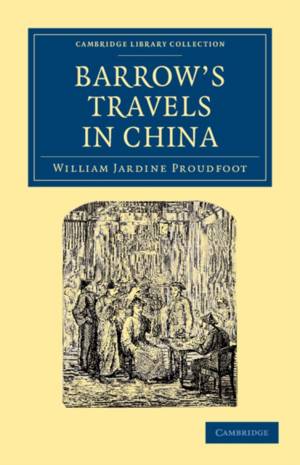
Je cadeautjes zeker op tijd in huis hebben voor de feestdagen? Kom langs in onze winkels en vind het perfecte geschenk!
- Afhalen na 1 uur in een winkel met voorraad
- Gratis thuislevering in België vanaf € 30
- Ruim aanbod met 7 miljoen producten
Je cadeautjes zeker op tijd in huis hebben voor de feestdagen? Kom langs in onze winkels en vind het perfecte geschenk!
- Afhalen na 1 uur in een winkel met voorraad
- Gratis thuislevering in België vanaf € 30
- Ruim aanbod met 7 miljoen producten
Zoeken
Barrow's Travels in China
An Investigation into the Origin and Authenticity of the ‘Facts and Observations' Related in a Work Entitled ‘Travels in China by John Barrow, F.R.S.'
William Jardine Proudfoot
€ 58,45
+ 116 punten
Uitvoering
Omschrijving
William Jardine Proudfoot (c.1804-1887) published his critique of Sir John Barrow's Travels in China (1804; also reissued in this series) with the agenda of exposing the latter as unreliable and unjust. Barrow had accompanied Lord Macartney on the first British mission to the Chinese Imperial Court (1792-4), in a party that also included the official astronomer, Dr James Dinwiddie, Proudfoot's grandfather. Comparing Barrow's account to that found in other records, Proudfoot concludes that the earlier work was 'a great humbug', ascribing to Barrow the 'powerful motive' of self-promotion. In a work full of vitriol against its subject, Proudfoot's concern is to honour the memory of the mission's members, whom he felt Barrow belittled and vilified, and also to point out factual inaccuracies, accusing him of seeking amusement rather than truth in his anecdotes. Read alongside Barrow's work, it makes for an interesting, scornful, and often entertaining counter.
Specificaties
Betrokkenen
- Auteur(s):
- Uitgeverij:
Inhoud
- Aantal bladzijden:
- 184
- Taal:
- Engels
- Reeks:
Eigenschappen
- Productcode (EAN):
- 9781108045636
- Verschijningsdatum:
- 12/07/2012
- Uitvoering:
- Paperback
- Formaat:
- Trade paperback (VS)
- Afmetingen:
- 140 mm x 216 mm
- Gewicht:
- 240 g

Alleen bij Standaard Boekhandel
+ 116 punten op je klantenkaart van Standaard Boekhandel
Beoordelingen
We publiceren alleen reviews die voldoen aan de voorwaarden voor reviews. Bekijk onze voorwaarden voor reviews.









